Top 7 Lexus NX300h Hybrid Problems and How to Fix Them Easily
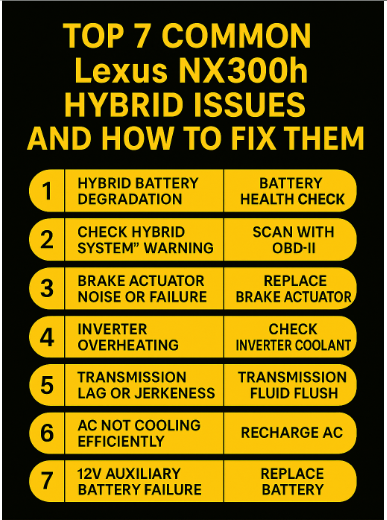
The Lexus NX300h is a popular luxury hybrid SUV known for its refined performance, comfort, and fuel efficiency. While it offers a smooth driving experience and the reliability Lexus is famous for, no vehicle is completely immune to problems—especially when complex hybrid systems are involved. If you own or plan to buy a Lexus NX300h, it’s important to be aware of the most common hybrid-related issues and how to address them before they escalate into costly repairs. In this post, we break down the top 7 common Lexus NX300h hybrid problems and practical solutions to fix each one. 1. Hybrid Battery Degradation Symptoms: Noticeable drop in fuel economy Sluggish acceleration “Check Hybrid System” warning light Causes: Natural wear due to age or mileage Frequent short trips or extreme temperatures Lack of proper maintenance How to Fix: Have a hybrid battery health check performed Replace with an aftermarket, OEM, or rebuilt hybrid battery depending on your budget In Sydney, Hybrid Automotive Service offers cost-effective replacement options with warranty Tip: Get your battery checked every 6–12 months if your car has over 100,000 km. 2. “Check Hybrid System” Warning Symptoms: Warning light appears on dashboard Car may enter limp mode Decreased performance or stalling Causes: Faulty sensors Weak or imbalanced battery cells Inverter or ECU issues How to Fix: Use a hybrid-compatible OBD-II scanner to identify specific codes Consult a hybrid specialist for full diagnostics Repair or replace the affected part (battery, inverter, or sensor) Tip: Don’t drive long distances with this warning. Early diagnosis can save you thousands. 3. Brake Actuator Noise or Failure Symptoms: Clicking or whirring noises when braking ABS or brake warning lights Soft or unresponsive brake pedal Causes: Malfunctioning brake actuator or booster Air in brake lines or hydraulic fluid leaks How to Fix: Replace the brake actuator (can cost between $1,500–$3,000 if not under warranty) Perform a full brake system flush Tip: Check for potential recalls on your VIN through Lexus, as some brake actuators were covered under warranty extensions. 4. Inverter Overheating Symptoms: Sudden power loss Stalling, especially on long drives Hybrid system fault codes Causes: Failing inverter cooling pump Low or dirty coolant Overloaded electrical system How to Fix: Check and top up inverter coolant Replace the inverter coolant pump if necessary Flush old coolant and use recommended Lexus coolant Tip: Avoid cheap universal coolants; always use Toyota/Lexus-approved types. 5. Transmission Lag or Jerkiness Symptoms: Hesitation when accelerating Jerky motion when shifting gears Noise during low-speed operation Causes: E-CVT (Electronic Continuously Variable Transmission) wear Faulty transmission fluid Software calibration issues How to Fix: Perform a transmission fluid flush Reprogram the transmission control unit (TCU) at a Lexus dealer In severe cases, rebuild or replace the transmission system Tip: Hybrid CVTs require specific fluids—always follow the manufacturer’s guidelines. 6. AC Not Cooling Efficiently Symptoms: Warm air from vents during idle AC not cooling on hot days Noises from the AC compressor Causes: Failing electric AC compressor Low refrigerant Blocked condenser or evaporator How to Fix: Recharge refrigerant (R134a or R1234yf, depending on model year) Inspect and service the compressor Clean or replace clogged filters and condenser coils Tip: Have your hybrid AC system serviced annually to maintain peak performance. 7. 12V Auxiliary Battery Failure Symptoms: Car won’t start Multiple dashboard warning lights Radio and power windows malfunction intermittently Causes: Battery older than 3–5 years Parasitic drain from accessories Frequent short trips that don’t allow recharging How to Fix: Replace with a new AGM (Absorbent Glass Mat) 12V battery Check for power-hungry devices or parasitic draw Tip: Test your 12V battery health at every oil change. 🧰 How to Prevent Lexus NX300h Hybrid Problems Get regular hybrid diagnostics from a trusted specialist Follow your Lexus service schedule without delays Use OEM or high-quality aftermarket parts Avoid DIY fixes if you’re not hybrid-trained Visit a hybrid-focused workshop like Hybrid Automotive Service in Sydney for proper evaluation and repairs
Top 10 Common Problems in Lexus RX 400h and How to Fix Them
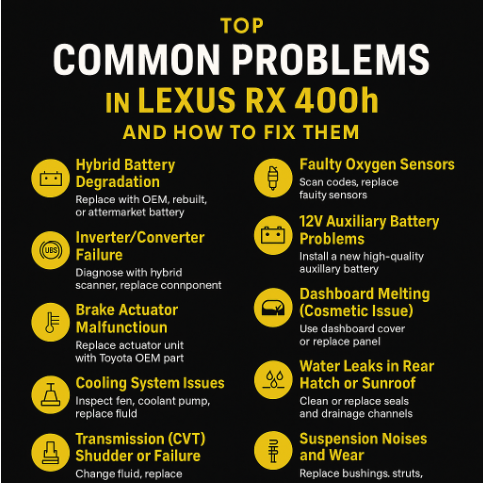
The Lexus RX 400h is a well-regarded luxury hybrid SUV known for its performance, comfort, and fuel efficiency. However, like any vehicle, especially older models from 2006–2008, it’s not without its issues. From hybrid battery failures to brake actuator malfunctions, being aware of these common problems can help you maintain your RX 400h and avoid unexpected breakdowns. At Hybrid Automotive Service, we specialize in diagnosing and repairing all hybrid-related issues with precision and care. 1. Hybrid Battery Degradation Symptoms: Decreased fuel economy, reduced performance, “Check Hybrid System” warning light. Fix: Hybrid battery replacement with OEM, aftermarket, or rebuilt options. We offer high-quality batteries with up to 3 years or 100,000 KM warranty. 2. Inverter/Converter Failure Symptoms: Warning lights, car not starting, sudden stalling. Fix: Diagnostic scan to confirm the fault. Replacement of inverter/converter is often necessary. 3. Brake Actuator Malfunction Symptoms: ABS and VSC warning lights, soft brake pedal, unusual pump noises. Fix: Replacement of the brake actuator with a genuine or refurbished unit. This is a known issue in RX 400h models. 4. Cooling System Issues Symptoms: Overheating, warning messages, poor AC or electrical performance. Fix: Check and replace inverter coolant pump, refill coolant, clean radiator. Regular maintenance can prevent major failures. 5. Transmission (CVT) Problems Symptoms: Hesitation during acceleration, shuddering, jerky shifts. Fix: Transmission fluid flush or, in severe cases, full transmission replacement. 6. Faulty Oxygen Sensors Symptoms: Check Engine Light, poor fuel economy, rough idle. Fix: Scan for trouble codes, replace faulty O2 sensors. This is a relatively inexpensive and quick repair. 7. 12V Auxiliary Battery Problems Symptoms: Difficulty starting, electrical glitches, dashboard not lighting up. Fix: Replace 12V battery. Always use a high-quality replacement for hybrid vehicles. 8. Dashboard Melting (Cosmetic Issue) Symptoms: Sticky, shiny, or melting dashboard under heat. Fix: Install a dashboard cover, or replace under warranty if available. Toyota has covered this issue in some regions. 9. Water Leaks in Rear Hatch or Sunroof Symptoms: Damp carpets, moldy smell, electrical shorts. Fix: Clean sunroof drain channels, inspect and reseal hatch weatherstripping. 10. Suspension Wear and Noises Symptoms: Clunking sounds, rough ride, uneven tire wear. Fix: Replace worn suspension parts like struts, control arms, or bushings. An alignment check is also recommended. How Hybrid Automotive Service Can Help Over 25 years of experience with Lexus and Toyota hybrid systems Accurate diagnostics using hybrid-specific tools OEM, rebuilt, and aftermarket part options Fast turnaround and affordable pricing We provide a 3-year or 100,000 KM warranty on hybrid battery replacements, ensuring peace of mind for our customers.
What to Expect from a Professional Hybrid Battery Condition Check
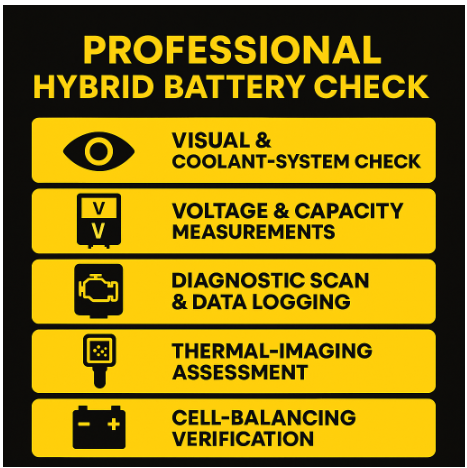
A professional hybrid battery condition check goes beyond simple DIY tests, offering a comprehensive health assessment of your vehicle’s most critical component. While at-home checks can flag obvious issues, only trained technicians using specialized equipment can pinpoint hidden faults, balance cell performance, and provide actionable recommendations. Whether you drive a Toyota Prius, Lexus RX, or any other hybrid, a Hybrid Automotive Service inspection delivers peace of mind—catching problems early and helping you avoid costly breakdowns down the road. When to Schedule a Professional Battery Check Knowing the right time to bring your hybrid in for inspection can save you from unexpected failures and extend your battery’s lifespan. Key Warning Signs “Check Hybrid System” Alert: Dashboard warnings signal that the battery management system has detected anomalies. Reduced Fuel Economy: Noticeable drops in mpg/km may indicate declining battery capacity. Overheating or Unusual Noises: Whirring fans, coolant leaks, or hot spot odors hint at cooling-system or cell issues. Recommended Service Intervals Mileage-Based: Aim for a full battery health scan every 60,000 km. Time-Based: Even if you drive under 60,000 km in four years, schedule a check to monitor age-related degradation. Pre-Inspection Preparation A little prep work ensures your technician can deliver the most accurate assessment: Gather Vehicle Information Make, model, year, and approximate mileage Recent service history—especially any hybrid-system repairs Record Error Codes Note any active warning lights If you have an OBD-II reader, jot down stored hybrid-related codes Prepare Your Questions “Which tests will you perform?” “Do you offer cell balancing or module-level repairs?” “What turnaround time and warranty do you provide?” The Inspection Process: Step by Step Here’s what typically happens under the hood when you bring your hybrid in: Visual & Coolant-System Check Inspect pack housing for leaks, corrosion, or damage Confirm coolant lines and fan operation for proper thermal management Voltage & Capacity Measurements Measure each module’s voltage with a high-precision meter Perform a controlled load test to estimate pack capacity and State-of-Health (SOH) Diagnostic Scan & Data Logging Use OEM-grade OBD-II tools to pull hybrid-system data Analyze fault codes, charge/discharge rates, and balance status Thermal-Imaging Assessment Scan the pack with an infrared camera to detect hot or cold spots Identify uneven heating patterns that signal cell degradation Cell-Balancing Verification Compare module voltages before and after balancing Ensure voltage spread is within manufacturer-specified limits Understanding Your Inspection Report After testing, your technician will provide a detailed report. Here’s how to interpret the key metrics: State-of-Health (SOH): A percentage that compares current capacity to the original factory rating. Voltage Spread: Difference between the highest and lowest module voltages—ideally under 0.1 V. Trouble Codes: Severity levels from minor software glitches to critical cell failures. Recommended Next Steps Minor Balancing: If SOH is high but voltages vary, cell balancing may restore performance. Module Replacement: For a few weak cells, swapping modules can be cost-effective. Pack Rebuild or Replacement: When SOH drops below ~70%, full pack refurbishment is often the best long-term solution. Cost & Time Estimates Every workshop differs, but here are ballpark figures and timelines: Service Type Typical Cost (AUD) Turnaround Time Basic Diagnostic Scan 80 – 120 30–60 minutes Full Capacity & Thermal Testing 250 – 350 2–4 hours Cell Balancing (per session) 150 – 200 1–2 hours Module-Level Repair or Replacement 400 – 650 (per module) 1–2 days Complete Battery Pack Rebuild/Replace 2,000 – 4,000 2–5 days Note: Dealerships may charge up to 20% more; independent hybrid specialists often offer better rates and faster service.
Hybrid Battery Specialists’ Tips for Maximizing Your Battery Lifespan
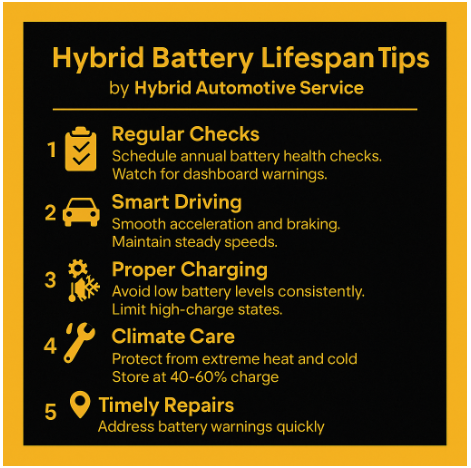
Hybrid vehicles rely on sophisticated battery systems to deliver fuel efficiency and reduced emissions. Maximizing your hybrid battery’s lifespan not only saves money but ensures optimal performance over the long term. At Hybrid Automotive Service, our battery specialists share their expertise to help you maintain your battery’s health. 1. Understand Your Hybrid Battery Hybrid vehicles typically utilize Nickel-Metal Hydride (NiMH) or Lithium-ion batteries. NiMH batteries are robust and common in older models, while Lithium-ion batteries offer lighter weight and better performance in newer models. On average, hybrid batteries last between 8-10 years or around 150,000-200,000 kilometers, though this depends significantly on maintenance and usage patterns. 2. Regular Maintenance and Checks Routine checks are critical. Specialists at Hybrid Automotive Service recommend scheduling a battery health check every 12 months. Key signs your hybrid battery might require attention include: Noticeable drops in fuel efficiency Frequent charging and discharging cycles Dashboard warning lights indicating battery issues Professional diagnostic equipment can identify battery deterioration before it becomes costly. 3. Optimal Driving Habits Your driving style impacts battery life significantly. Here are tips from our specialists: Avoid rapid acceleration and abrupt braking to minimize battery strain. Use regenerative braking effectively to recharge your battery during deceleration. Maintain steady speeds where possible, reducing excessive demands on your battery. 4. Proper Charging Practices While hybrid vehicles manage charging autonomously, adopting certain practices can still help: Avoid consistently driving with an almost-depleted battery. Minimize extended periods of battery idle time at low charge. Avoid prolonged high-charge states to reduce stress on the battery cells. 5. Climate and Storage Considerations Extreme temperatures can adversely affect battery performance. To protect your hybrid battery: Park your vehicle in shaded areas or garages to avoid direct sunlight and excessive heat. In colder climates, allow the vehicle to warm up gradually rather than quick heating. When storing your vehicle for extended periods, specialists at Hybrid Automotive Service recommend leaving the battery charged at approximately 40-60%. 6. Timely Repairs and Professional Advice Responding promptly to battery warnings can prevent extensive damage. Specialists have the tools and training to diagnose battery issues accurately. Trusting general mechanics might lead to missed subtle signs that hybrid battery experts can identify swiftly. 7. Common Misconceptions Debunked At Hybrid Automotive Service, we’ve encountered various myths regarding hybrid batteries: Myth: Hybrid batteries require frequent replacements. Truth: With proper maintenance, most hybrid batteries last beyond their warranty periods, often surpassing 10 years. Myth: DIY repairs can save money. Truth: Hybrid batteries require specialized knowledge and tools, making DIY repairs risky and potentially more costly.
How Much Does It Cost to Fix the C1310 Code in Australia?
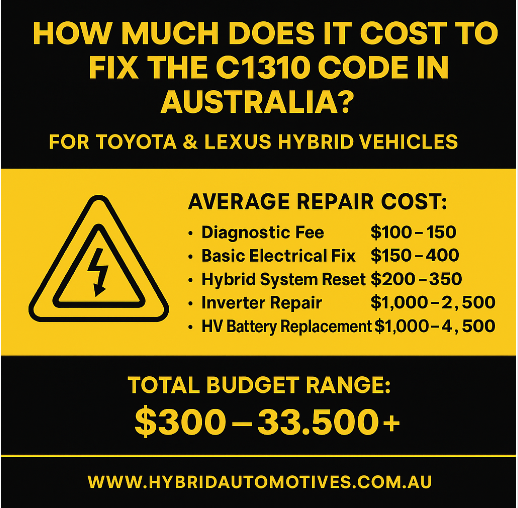
If you’ve recently encountered a C1310 HV System Malfunction warning in your Toyota or Lexus hybrid vehicle, you’re not alone. This error code is a common issue among hybrid owners and typically indicates a problem with your vehicle’s High Voltage (HV) system. Understanding the cost to fix this code can help you plan for repairs and avoid unnecessary expenses. What is the C1310 HV System Malfunction Code? The C1310 diagnostic trouble code (DTC) indicates a malfunction in your hybrid vehicle’s high voltage system. This code is usually stored in the brake control module, which receives error signals from the hybrid control ECU. When something goes wrong with the hybrid battery or associated systems, this fault code is triggered. 🚗 Vehicles Commonly Affected: Toyota Prius (Gen 2, 3, and 4) Lexus CT200h Lexus RX400h / RX450h Toyota Camry Hybrid Lexus IS300h / ES300h ⚠️ Common Symptoms: “Check Hybrid System” message on the dashboard ABS or brake warning lights Vehicle may not start or drive properly Reduced power or fuel economy 🛠️ What Causes the C1310 Code? The C1310 code is often a result of one or more of the following: Failing hybrid battery (voltage imbalance, overheating) Faulty inverter assembly or DC-DC converter Hybrid ECU issues Loose or corroded HV wiring/connectors Aftermarket hybrid battery not properly integrated 💰 Average Cost Breakdown in Australia Let’s take a closer look at how much it may cost to diagnose and repair this fault code in Australia. 🔧 1. Diagnostic Fee Most workshops will begin with a scan of the hybrid system using a specialized diagnostic tool. Cost: $100 – $150 🔧 2. Cost by Repair Type Repair Type Estimated Cost (AUD) Basic Electrical Fix (Sensor/Fuse/Wiring) $150 – $400 Hybrid System Reset/Calibration $200 – $350 Inverter Repair or Replacement $1,000 – $2,500 HV Battery Replacement – Rebuilt $1,000 – $1,500 HV Battery Replacement – Aftermarket New $1,500 – $2,200 HV Battery Replacement – OEM New (Toyota/Lexus) $2,800 – $4,500 Note: Prices vary depending on your location, vehicle model, and whether genuine or aftermarket parts are used. 📍 Cost Variations Across Australia Repair costs are influenced by your location: Sydney & Melbourne: Competitive pricing due to more hybrid repair specialists. Brisbane & Perth: Slightly higher prices due to fewer workshops. Regional Areas: May incur additional costs for parts shipping or fewer service providers. 🛠️ Can You Fix It Yourself to Save Costs? If you’re technically inclined, you might be tempted to reset the code using a scan tool. However, this is not recommended unless you’re sure the root issue is fixed. Clearing the code without repairs could: Mask the real issue Lead to further system damage Invalidate your vehicle warranty It’s always best to consult with a hybrid battery specialist. 🏆 Why Choose a Hybrid Specialist? General mechanics may not have the tools or expertise to accurately diagnose and repair HV systems. That’s where specialists like Hybrid Automotive Service stand out. 🔧 Why Hybrid Automotive Service? Affordable hybrid diagnostics starting at $100 Certified technicians trained in Toyota and Lexus hybrid systems OEM, rebuilt, and aftermarket battery options 3-year or 100,000 KM warranty on batteries Located in Belmore, Sydney – serving NSW-wide 👉 Book your C1310 diagnostic today at www.hybridautomotives.com.au 📞 When Should You Seek Immediate Help? If multiple warning lights appear Vehicle fails to start or loses power Sudden drop in fuel economy You recently had your hybrid battery replaced In these cases, continuing to drive could worsen the damage. It’s best to call a specialist immediately. 📌 Summary: What You Should Budget For Scenario Estimated Cost (AUD) Basic Fault (Sensor/Wire) $150 – $400 Hybrid Battery System Reset $200 – $350 Inverter or ECU Repair $1,000 – $2,500 Battery Replacement (Rebuilt) $1,000 – $1,500 Battery Replacement (New OEM) $2,800 – $4,500 Total Budget Range: $300 – $3,500+
Check Hybrid System Warning in Lexus RX 400h
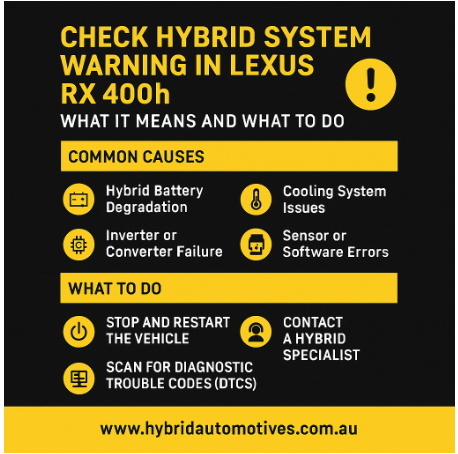
If you’re driving a Lexus RX 400h and suddenly see the warning message “Check Hybrid System,” it’s important to understand what this means and how to respond. This warning can indicate a range of issues from minor sensor glitches to serious battery or inverter problems. Acting quickly can help prevent further damage and costly repairs. At Hybrid Automotive Service, we specialize in diagnosing and fixing hybrid system issues, ensuring your Lexus stays safe and efficient. What Does “Check Hybrid System” Mean in a Lexus RX 400h? The “Check Hybrid System” warning is a general alert from your vehicle’s onboard computer, indicating a malfunction in one or more hybrid components. These systems include the high-voltage battery, inverter/converter, electric motor, and various sensors. When a fault is detected, the vehicle triggers the warning to protect the system and alert the driver. Common Causes of the Warning 1. Hybrid Battery Degradation Over time, the hybrid battery can lose its efficiency and capacity. This is one of the most common reasons for the warning, especially in older RX 400h models. 2. Inverter or Converter Failure The inverter plays a critical role in converting power between the electric motor and battery. A failure in this component can disrupt the entire hybrid system. 3. Cooling System Issues Hybrid components such as the battery and inverter need proper cooling. If the cooling fan or fluid is malfunctioning, it can trigger the warning. 4. Sensor or Software Errors Sometimes, faulty sensors or outdated software can miscommunicate with the system’s ECU, leading to a false warning. What to Do When You See the Warning Step 1 – Stop and Restart the Vehicle Sometimes, a simple reset by turning the vehicle off and back on can clear minor glitches. However, this is only a temporary solution. Step 2 – Scan for Diagnostic Trouble Codes (DTCs) Using a hybrid-specific diagnostic scanner can reveal the exact issue. These tools read fault codes from the hybrid control module. Step 3 – Contact a Hybrid Specialist Not all general mechanics are equipped to handle hybrid diagnostics. At Hybrid Automotive Service, we use advanced tools and expertise to pinpoint and fix hybrid system faults. Repair vs Replacement – What Are Your Options? Depending on the fault, you may need minor repairs (like replacing a cooling fan or sensor) or major components such as the hybrid battery. Our workshop offers multiple battery replacement options: OEM Batteries from Toyota Rebuilt Hybrid Batteries Brand New Aftermarket Batteries All come with a 3-year or 100,000 KM warranty. Prevention Tips to Avoid the Warning Schedule regular hybrid system inspections. Monitor and maintain inverter coolant levels. Avoid over-draining the hybrid battery. Get software updates during service intervals. Why Choose Hybrid Automotive Service? Over 25 years of experience with Lexus hybrid systems Fast same-day service in Sydney and nearby suburbs Affordable pricing with multiple battery options Professional diagnosis and genuine customer support
Check Hybrid System Warning in Lexus CT200h: What It Means and How to Fix It
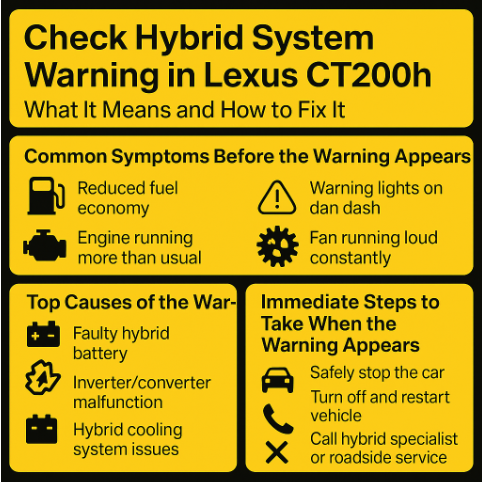
The “Check Hybrid System” warning in your Lexus CT200h can be alarming, especially if you’re not sure what triggered it. This warning is a signal from your car’s onboard diagnostics system, indicating that something is wrong within the hybrid drivetrain. Ignoring it can lead to reduced performance or even system failure, so it’s crucial to understand the cause and act quickly. What Is the “Check Hybrid System” Warning in Lexus CT200h? This warning typically appears on your dashboard when your hybrid system detects a malfunction. It could involve the Lexus CT200H Hybrid Battery, inverter, cooling system, or related sensors. The CT200h relies on a combination of an internal combustion engine and an electric motor, so any disruption can affect fuel efficiency and vehicle performance. Common Symptoms Before the Warning Appears Before the warning message shows up, you might notice: A drop in fuel efficiency The engine running more frequently, even at low speeds The hybrid cooling fan running loudly or constantly Sluggish acceleration Other dashboard lights like the red triangle or check engine light These are early signs that your hybrid system may be under stress. Top Causes of the Warning Here are the most common reasons the warning appears: 🔋 1. Hybrid Battery Failure The most frequent cause. Over time, hybrid batteries degrade, and when module voltage imbalances occur, the system triggers a warning. ⚡ 2. Inverter/Converter Malfunction The inverter converts DC from the battery to AC for the electric motor. A failure here can severely impact the system. ❄️ 3. Cooling System Problems Overheating in the hybrid battery due to a clogged fan or blocked vent can cause the system to shut down as a protective measure. 📉 4. Sensor or ECU Issues Faulty sensors or software glitches can throw error codes that lead to false warnings. 🔋 5. 12V Auxiliary Battery Issues A weak or dead 12V battery can trigger hybrid system faults due to voltage drops. Immediate Steps to Take When the Warning Appears If the “Check Hybrid System” message appears: Safely pull over and stop the car. Turn off the engine and restart after a minute to see if the warning clears. Do not continue driving if the warning persists. Call a hybrid specialist or roadside assistance immediately. Attempting to drive long distances can cause further damage or a breakdown. Diagnostic Process Explained To identify the exact issue, professionals use advanced OBD-II diagnostic tools. They’ll check for hybrid system fault codes such as: P0A80 – Replace Hybrid Battery P0A7F – Battery Pack Deterioration P3000 – HV Battery Control System Error A proper diagnosis includes checking module voltages, inverter status, and fan operations. Repair and Replacement Options ✅ Battery Repair vs. Replacement Some hybrid specialists offer module balancing or reconditioning if only one part is failing. However, for long-term reliability, a full replacement is often recommended. ✅ OEM, Aftermarket & Rebuilt Options OEM batteries from Toyota offer the longest life but come at a higher price. Rebuilt batteries are a budget-friendly option with moderate warranty coverage. Aftermarket batteries balance cost and performance, especially when installed by a trusted provider. Average Costs in Australia Battery Replacement: $1,800–$3,200 Inverter Repair: $1,200–$2,000 Fan Cleaning or ECU Update: $150–$500 ⏱️ Repair Time Most hybrid battery replacements are completed the same day by experienced workshops. Preventive Maintenance Tips To reduce the risk of hybrid system warnings: Inspect hybrid battery health every 6–12 months Clean cooling fan and battery vent Check inverter coolant levels regularly Update ECU software at recommended service intervals Regular hybrid-specific service can significantly extend battery life. Why Choose Hybrid Automotive Service At Hybrid Automotive Service, we specialize in diagnosing and repairing Lexus CT200h hybrid issues. Our workshop in Belmore, NSW offers: Expert hybrid diagnostics OEM, rebuilt, and aftermarket battery replacements 3-year or 100,000 KM warranty Fast, same-day service We’ve helped hundreds of Lexus owners restore their hybrid systems affordably and reliably.
How Much Does It Cost to Replace a Toyota Hybrid Battery?

When owning a Toyota hybrid vehicle, one common concern is the cost of hybrid battery replacement. Whether you’re driving a Prius, Camry Hybrid, or Estima, the battery pack is the heart of your vehicle’s hybrid system. So, how much does it cost to replace a Toyota hybrid battery? Typically, the cost ranges between $1,500 to $4,500 AUD, depending on your vehicle model and the type of battery you choose—aftermarket, rebuilt, or OEM. At Hybrid Automotive Service, we offer affordable pricing tailored to your needs. Why Do Toyota Hybrid Batteries Need Replacing? Toyota hybrid batteries are designed to last, often well beyond 8–10 years or 150,000–200,000 km. However, over time, battery cells degrade due to repeated charging cycles, high temperatures, and usage conditions. When performance drops or warning lights appear (like “Check Hybrid System”), it may be time for a replacement. Factors That Affect Toyota Hybrid Battery Replacement Cost 1. Vehicle Model Different Toyota models use different battery packs. For instance: Toyota Prius (Gen 2–4) battery replacement usually costs $1,500–$3,000 AUD Toyota Camry Hybrid can cost around $2,400–$3,800 AUD Toyota Estima Hybrid may range from $2,500–$5,500 AUD 2. Battery Type At Hybrid Automotive Service, we provide three options: Rebuilt Battery – Most economical, reconditioned cells, costs around $1,500–$2,200 AUD Aftermarket Brand New Battery – New cells with competitive pricing, typically $2,200–$3,000 AUD OEM (Genuine Toyota) – Best quality and lifespan, pricing from $3,200–$4,500 AUD 3. Warranty Coverage Warranties can significantly affect your long-term value. We offer: 1-Year Warranty on rebuilt batteries 2-Year Warranty on aftermarket batteries 3-Year Warranty on OEM batteries This gives you peace of mind no matter your budget. Signs Your Toyota Hybrid Battery Needs Replacement If you notice any of the following, it’s time to get your battery checked: Warning message: “Check Hybrid System” Decreased fuel efficiency Engine running more than usual Loud fan noise from the rear Sudden loss of power or failure to start Bring your vehicle to Hybrid Automotive Service for a Free Battery Health Check. Why Choose Hybrid Automotive Service? We are Sydney’s leading hybrid battery replacement experts. Here’s why customers trust us: Certified Technicians: We specialize in Toyota and Lexus hybrid systems Fast Turnaround: Same-day service available for most models Affordable Options: Flexible pricing to fit all budgets Mobile Service: We come to you in Sydney and surrounding suburbs
Check Hybrid System – Stop the Vehicle in a Safe Place: What It Really Means
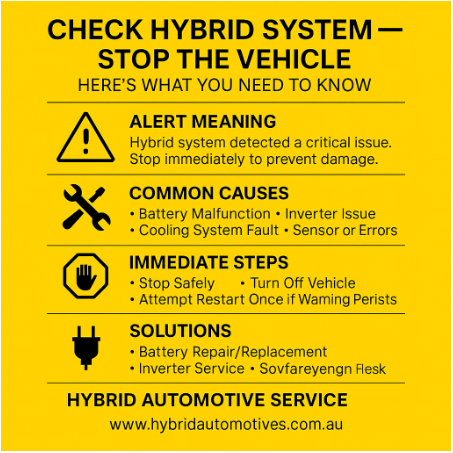
If you see the “Check Hybrid System – Stop the Vehicle in a Safe Place” warning, it indicates a significant issue with your hybrid car’s system, often related to the battery or other essential components. Ignoring this warning could lead to severe vehicle damage, expensive repairs, or even dangerous situations on the road. Understanding the “Check Hybrid System – Stop the Vehicle” Warning This alert means the car’s hybrid system has detected a malfunction requiring immediate attention. The vehicle advises stopping safely because continuing to drive could compromise your safety and the integrity of your hybrid system. Common Causes of the ‘Check Hybrid System’ Alert Hybrid battery failure or malfunction: Deteriorated cells or a battery approaching its end-of-life. Issues with the inverter/converter: Essential components for battery charging and electricity flow. Overheating of hybrid components: Often due to poor coolant circulation. Cooling system issues: Damaged pumps or clogged cooling lines. Software or sensor faults: Errors that trigger warnings unnecessarily. Immediate Steps to Take When You See This Warning Pull over safely: Find the nearest safe spot to park your vehicle. Turn off the vehicle: Shut down your car completely and wait for a few minutes. Attempt restart cautiously: After waiting, cautiously restart the vehicle once. If the warning persists, stop again immediately. Call roadside assistance: If unable to safely restart, call professional roadside assistance to avoid further damage. Diagnosing the Issue OBD-II scanner: Initial diagnosis can be done by connecting an OBD-II scanner to read the specific error codes. Professional diagnostic: Visiting specialists like Hybrid Automotive Service ensures an accurate diagnosis and effective solutions. Common Error Codes Associated with ‘Check Hybrid System’ Warning P0A80: Indicates a need for hybrid battery replacement. P3013, P3014, P3015: Specific battery cell issues that require attention. P0A93: Reflects problems with the inverter cooling system. Solutions and Repairs for Hybrid System Issues Hybrid battery repair/replacement: Options include OEM, rebuilt, or aftermarket batteries tailored to different budgets and needs. Inverter/converter repair: Ensures electricity is effectively regulated between battery and motor. Cooling system maintenance: Prevents overheating by regularly checking coolant levels and replacing worn parts. Software updates and sensor replacements: Corrects false alarms and ensures proper functioning. Preventing Future Hybrid System Alerts Regular hybrid system check-ups: Frequent professional inspections detect issues before they escalate. Routine hybrid battery maintenance: Prolong battery lifespan with periodic conditioning and diagnostics. Monitor warning signs: Watch for decreased fuel efficiency, unusual noises, or slower performance. Follow recommended service schedule: Stick to manufacturer guidelines for servicing intervals. Why Choose Hybrid Automotive Service? Experienced hybrid technicians: Specialized knowledge and training in hybrid vehicle systems. Comprehensive battery options: Choose from OEM, rebuilt, or aftermarket hybrid batteries. Same-day replacement service: Minimal downtime, getting you back on the road quickly. Reliable warranty: Protection and peace of mind after service completion.
Lexus CT 200h Common Problems: What to Watch Out For

The Lexus CT 200h is a stylish, fuel-efficient hybrid hatchback loved for its smooth driving experience and eco-friendliness. However, like all hybrid vehicles, the CT 200h is not immune to mechanical and electrical issues, especially as it ages or racks up mileage. At Hybrid Automotive Service, we’ve worked on hundreds of Lexus hybrids across Sydney and have seen a consistent pattern of common issues owners face. 1. Hybrid Battery Degradation Problem: One of the most frequent issues in the CT 200h, especially in vehicles over 8–10 years old or with 150,000+ kilometers, is hybrid battery failure. Symptoms: Drop in fuel economy Warning lights (Check Hybrid System) Sluggish acceleration Fan noise from the rear (battery cooling system overworking) Fix: At Hybrid Automotive Service, we offer three replacement options: OEM Hybrid Battery Rebuilt Hybrid Battery (with new modules) Aftermarket Hybrid Battery (affordable & warranty-backed) We also provide mobile battery replacement services across Sydney for your convenience. 2. Brake Actuator & ABS Pump Failure Problem: Another common fault is with the brake actuator (ABS pump) system. This component controls braking pressure and is crucial for regenerative braking in hybrids. Symptoms: Loud clicking or buzzing sound after starting the car Brake warning light or ABS light on the dashboard “Check VSC System” warning Spongy or inconsistent brake pedal Fix: This is a critical safety component. At Hybrid Automotive Service, we specialize in ABS actuator repair and replacement for Lexus hybrids using genuine parts. 3. Inverter Failure Problem: The inverter/converter unit regulates electricity between the hybrid battery and electric motor. It can fail due to overheating or wear over time. Symptoms: Vehicle stalls suddenly “Check Hybrid System” or red triangle warning Difficulty starting the car Engine shuts off unexpectedly Fix: The inverter is a complex component. We recommend immediate diagnosis. We perform inverter replacements using OEM or tested refurbished units depending on your budget. 4. EV Battery Cooling Fan Clogging Problem: The battery cooling fan can accumulate dust, hair, and debris over time, especially if pets frequently ride in the car. Symptoms: Increased noise from the rear fan Overheating hybrid battery Hybrid system errors Fix: Our technicians perform regular battery fan cleaning during routine inspections or battery replacements. This simple maintenance can help prolong battery life. 5. 12V Auxiliary Battery Weakness Problem: The small 12V auxiliary battery powers startup systems and accessories. It often gets overlooked in hybrids. Symptoms: Difficulty starting the car Dim dashboard lights Frequent need for jump-starts Fix: We provide affordable 12V battery testing and replacement at our Belmore workshop or via mobile service. 6. HVAC & Air Conditioning Issues Problem: Owners have reported issues with climate control systems, often linked to faulty sensors or AC inverter issues. Symptoms: AC blowing hot air Climate control not responding Irregular fan speeds Fix: At Hybrid Automotive Service, we inspect hybrid climate systems and replace faulty inverters or sensors to restore comfort. Preventative Tips from Hybrid Automotive Service To avoid expensive repairs, we recommend: Servicing your CT 200h every 10,000–15,000 KM Regular hybrid battery diagnostics Cleaning the battery fan every 12 months Checking 12V battery and brake fluid annually Using qualified hybrid specialists only Book a Lexus CT 200h Inspection Today At Hybrid Automotive Service, we specialize in Toyota and Lexus hybrids. Whether you’re facing battery problems, brake issues, or electrical faults, we’re here to help. Our services are available at our Belmore workshop or via mobile units across Sydney, Parramatta, Bankstown, and beyond. 📞 Call Us: +61 493 688 444 🌐 Visit: www.hybridautomotives.com.au 📍 Location: Belmore, NSW 🛠️ Service: Diagnosis, repair, and battery replacement for Lexus CT 200h
